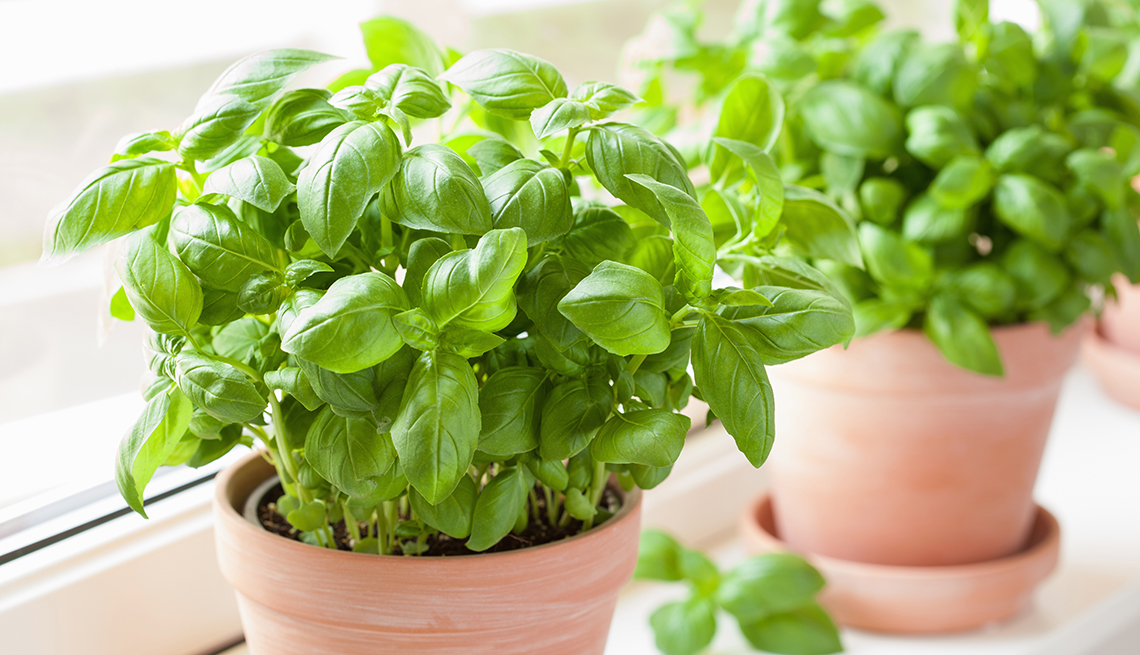Fresh herbs add subtle flavor and a pop of color to virtually any dish. In addition, they offer health benefits that you might not be aware of.
Try adding these fresh herbs to your meals and drinking them as a tea. Or, grow your own at home for easy access to these culinary and wellness spices!
Rosemary for Cognitive Health
Throughout history, rosemary has been known as the herb of memory. People have used it in ancient Greece and Rome to strengthen memory. Fortunately, science is putting the folk stories to the test and discovering that this powerful plant has a lot to offer.
One of the reasons is that the oil contained in the leaves has been shown to prevent the breakdown of acetylcholine, which is a neurotransmitter known to improve memory and boost alertness. In a study, students that inhaled the scent of rosemary during serial subtraction tests showed an improvement in speed and accuracy.
Rosemary contains 1,8-cineole, a compound that activates the brain’s motor neurons. This causes a chemical release that is similar to current drug treatments for Alzheimer’s and dementia.
Another benefit of rosemary is that it reduces cortisol, the stress hormone, by interacting with the brain and central nervous system. This results in an antidepressant, anti-anxiety, antispasmodic, and mild analgesic effect. This makes it a great natural remedy for headaches, migraines, insomnia, and emotional upset.
Basil for Anti-Inflammatory Properties
Basil leaves contain a variety of antioxidants that act as free-radical scavenging agents to prevent damage to cells. Sweet basil, lemon basil and lime basil all contain eugenol, citral and limonene, which help reduce oxidative stress in the body that can lead to aging and diseases such as heart disease, cancer and arthritis.
These essential oils also inhibit the activity of an enzyme in the body called cyclooxygenase, which is responsible for inflammation. This makes basil a good option for people with inflammatory health conditions like rheumatoid arthritis and inflammatory bowel disease.
In addition to its anti-inflammatory properties, basil has been shown to support liver health by helping it remove fat buildup and maintain normal blood sugar levels. It has also been found to improve digestion by promoting healthy gut microflora and increasing immunity. This is because it has natural detoxification properties and can balance acidity in the body. This can also help reduce bloating, water retention and stomach discomfort. Research has also shown that it can help prevent the accumulation of fatty deposits in the liver and slow down aging in this organ.
Cilantro for Detoxification
Cilantro (Coriandrum sativum) is one of the best detoxifying herbs in existence. It can help remove heavy metals from your body, including mercury and lead, that accumulate over time from environmental toxins and from eating contaminated food. Cilantro’s chelating properties mobilize these toxins and make them easier for your liver to excrete. It also has been found to decrease the absorption of these metals in the gut.
Another detoxifying herb is chlorella, a green algae that is often taken in combination with cilantro. Chlorella has a strong ability to eliminate toxic metals from the body and can even help remove mercury fillings. It also has anti-fungal, antioxidant and antiviral properties to promote your health.
Juicing fresh cilantro leaves and stems multiple times a day is a great way to concentrate the healing properties of this powerful herb. You can also use it in smoothies, soups or as a garnish for savory dishes. You can also purchase a cilantro tinctured extract, which will provide the same beneficial effects as the fresh herb in smaller doses.
Thyme for Respiratory Health
The aromatic herb thyme, scientifically known as Thymus vulgaris, is an integral ingredient in many recipes and has numerous medicinal properties. Thyme is packed with antioxidants, including vitamin C, which can help boost immunity and fight against the aging process. In addition, it contains a wide variety of nutrients like potassium, manganese, zinc and calcium.
Thyme is also a natural expectorant, helping your body get rid of mucus and phlegm from your lungs. It also has antimicrobial properties that can help fight infections like the common cold. It can be taken as a tea to treat cough and chest congestion.
Another benefit of thyme is that it may improve mood, thanks to the presence of carvacrol in its essential oil. According to one animal study, it has been found to increase levels of serotonin and dopamine. It’s important to note, however, that more research is needed to confirm these claims.
Mint for Digestive Support
A cup of mint tea can help to soothe an upset stomach, relieve symptoms of indigestion and stimulate the production of digestive juices. It also helps to normalize digestive functions and reduce bloating and flatulence. It also contains menthol, which can provide an aromatic decongestant that might break up mucus and make it easier to expel from the body.
Peppermint oil has been shown to have antiseptic, antibacterial and anti-inflammatory properties. It can also relax the smooth muscles that line much of the gastrointestinal tract. This makes it a good herbal remedy for treating irritable bowel syndrome (IBS). It can reduce abdominal pain, diarrhoea and bloating by relieving the spasms that occur in people with IBS.
Many people enjoy consuming fresh mint in teas and other beverages. They can also add it to their cooking. However, it is best to add mint leaves at the end of the cooking process so that they don’t lose their flavour and texture. You can buy fresh mint at E. Armata Inc, a wholesale produce Staten Island company.
Parsley for Nutrient Boost
Parsley (Petroselinum crispum) is a popular garnish but it’s also loaded with nutrients. One cup of chopped parsley has more than 150% of the recommended daily intake of vitamin C. It also contains vitamins K, A and E and minerals like potassium, magnesium, iron and zinc. In addition, it is a good source of volatile oils such as myristicin, limonene, eugenol and alpha-thujene that have cancer-fighting properties.
This herb is a great source of iron, which is needed for blood formation. It is also a wonderful natural source of vitamin A and vitamin K, which are important for bone health. It’s high in folates as well, which promotes healthy cells and a strong immune system.
Aside from the usual greens like kale, spinach and romaine lettuce, herbs are a must-have in your diet because of their many surprising health benefits. Incorporate them into your smoothies, soups and salads for a nutrient-rich meal! Having a wide variety of foods can reduce your risk of health conditions and diseases, and herbs are a great way to add flavor and color to meals.
Oregano for Immune System Enhancement
Oregano is an immune-boosting superfood that has antifungal, antibacterial, and antioxidant properties. It’s also known to help with respiratory issues like a sore throat or cough. In fact, one study found that people with upper respiratory infections who used a throat spray that included oregano oil and diluted eucalyptus, peppermint, and rosemary essential oils felt better 20 minutes later. The oil’s carvacrol content interferes with viruses, and it enhances the function of white blood cells, which are responsible for identifying and eliminating harmful invaders like bacteria and viruses.
Oregano oil can also boost your gut microbiome by balancing good and bad bacteria. According to a recent animal study, oregano extract improves gut health by reducing oxidative stress and increasing beneficial microbes.
Try adding oregano to your diet by incorporating it into cooking. The heat of the food releases the aromatic compounds and boosts flavor as well as potential wellness benefits. You can also take oregano capsules as a supplement. They’re easy to swallow and seamlessly blend gastronomy and wellness.
Conclusion
Fresh herbs add flavor and aroma to many dishes, but they are also brimming with vitamins, minerals, and other nutrients that support health. To make the most of your herbs, properly wash, store, and cook them.
To store fresh herbs, rinse them under cool running water, shake off excess moisture, and pat dry with paper towels. More delicate herbs like chives, cilantro, parsley, and chervil should be handled carefully in comparison to heartier herbs like rosemary and thyme.
For a quick herb boost, sprinkle chopped herbs on root vegetables before roasting them, in salads, in marinades, or use them to flavor homemade soups and stews. Dried herbs can also be used, but they have a stronger flavor and are best when added to already-cooked foods.
When shopping for herbs, choose ones that are bright green with no signs of wilting or discoloration. Avoid herbs that smell sweet or cloying, as these may be going bad.



